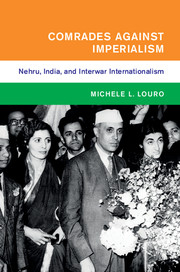Book contents
- Comrades against Imperialism
- Global and International History
- Comrades against Imperialism
- Copyright page
- Dedication
- Contents
- Figures
- Acknowledgments
- Note on Text and Transliteration
- Abbreviations
- Introduction Nehru and the Interwar World
- Part I Mobilizing against Empire, 1927–1930
- 1 A “Real” League of Nations
- 2 The Making of the League against Imperialism, 1927
- 3 Internationalizing Nationalism in India, 1928–1929
- 4 Anti-Imperialism in Crisis, 1929–1930
- Part II Afterlives of Anti-Imperialism
- Bibliography
- Index
1 - A “Real” League of Nations
The Brussels Congress, 1927
from Part I - Mobilizing against Empire, 1927–1930
Published online by Cambridge University Press: 22 February 2018
- Comrades against Imperialism
- Global and International History
- Comrades against Imperialism
- Copyright page
- Dedication
- Contents
- Figures
- Acknowledgments
- Note on Text and Transliteration
- Abbreviations
- Introduction Nehru and the Interwar World
- Part I Mobilizing against Empire, 1927–1930
- 1 A “Real” League of Nations
- 2 The Making of the League against Imperialism, 1927
- 3 Internationalizing Nationalism in India, 1928–1929
- 4 Anti-Imperialism in Crisis, 1929–1930
- Part II Afterlives of Anti-Imperialism
- Bibliography
- Index
Summary
- Type
- Chapter
- Information
- Comrades against ImperialismNehru, India, and Interwar Internationalism, pp. 19 - 64Publisher: Cambridge University PressPrint publication year: 2018



